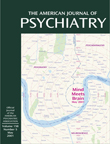Sweet Taste Preference as a Risk Factor for Alcohol Dependence
Abstract
OBJECTIVE: Previous research has found that alcoholics have a greater preference for sweet solutions than comparison subjects. This study tested the hypothesis that preference for sweet solutions is a marker for alcoholism risk. METHOD: A total of 122 nonalcoholic subjects (59 men) participated. Fifty-eight subjects had a paternal history of alcoholism, and 64 did not. Each subject rated a series of sucrose solutions for intensity of sweetness and degree of preference. RESULTS: Subjects were able to rate accurately the relative intensity of sweetness in the sucrose solutions. Both subjects with and those without a paternal history of alcoholism preferred a 0.42-M sucrose solution, irrespective of gender. CONCLUSIONS: This study failed to support the hypothesis that sweet preference is a marker of alcoholism risk. The sweet preference observed previously among alcoholics may be a consequence of chronic alcohol consumption or other factors associated with heavy drinking.



